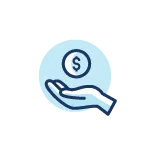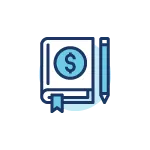Key Takeaways
- Before diving into homeownership, assess your finances thoroughly, considering not just the mortgage but also taxes, insurance, maintenance costs, and utilities.
- Aim to keep your total mortgage payment at or below 25% of your take-home pay.
- Build up an emergency fund, pay off existing debts, and save for a substantial down payment to establish a solid financial foundation before committing to a mortgage.
Are you on the hunt for a new home and wondering how much you can really afford?
When determining how much home you can afford, lenders combine your monthly income and your monthly debt payments to calculate what monthly mortgage payment you can manage.
Next, lenders will then use that monthly mortgage payment to determine how big of a mortgage you qualify for based on the current interest rates, the loan term you choose and the amount you put down.
But this isn’t a one-size fits all approach and often lenders will approve you for a larger mortgage than you may be able to handle. That could turn the dream of being a homeowner into a financial nightmare.
So how much home can you really afford and how do you determine that amount?
Hidden Costs of Homeownership
Owning a home comes with more expenses than just the mortgage payment. When considering how much house you can afford, consider all the hidden costs of home ownership.
- Property taxes: Property taxes vary depending on where you live and the value of your home. Be prepared to budget for annual property tax payments, which can fluctuate over time.
- Homeowners insurance: Insurance protects your home and belongings from unexpected events like fires, theft, or natural disasters. While it's essential for peace of mind, it adds to your monthly expenses.
- Maintenance and repairs: From leaky faucets to roof repairs, homeowners are responsible for maintaining their property. Budget for routine maintenance tasks and set aside funds for unexpected repairs, which can add up over time.
- Utilities: As a homeowner, you'll be responsible for paying utilities such as water, electricity, gas, and trash collection. These recurring expenses can vary based on factors like the size of your home and your energy usage habits.
- Homeowners Association (HOA) Fees: If you buy a property in a planned community or condominium, you may have to pay monthly or annual HOA fees. These fees cover maintenance of common areas, amenities, and community services.
- Home improvement projects: Whether you're updating the kitchen or adding a new deck, home improvement projects can be costly. Budget for renovations and upgrades to enhance your home's value and comfort.
One of the biggest mistakes first-time homeowners make is spending more than they can afford by overlooking the “true” cost of homeownership. When budgeting for your first home, these overlooked costs can have a big impact on your bottom line:
5 Steps to Determine How Much House You Can Afford
1Create a Budget
Before deciding how much house you can afford, you first need to know how much to work with. This all starts with creating a simple monthly budget.
When looking at your monthly budget , first look at your monthly income. No, we don’t mean gross monthly income, but the amount that hits your bank account each month.
Once you know your monthly take-home pay, you can then determine how much mortgage you can afford.
2Use 25% of Your Income
As mentioned above, the lender will use your income and debt to determine your allowable monthly payment and then create the mortgage amount from there.
However, there is a very simple way to gauge how much home you can afford by using your income.
Pro Tip: A good rule of thumb is to keep your total mortgage payment at 25% or below your take-home pay.
"Total mortgage payment” refers to the total of the principal, interest, taxes and insurance payments.
Let’s say you determine your monthly take-home pay to be $8,000. Using the 25% rule, you know you can afford to make a total monthly mortgage payment of $2,000.
Next, using a mortgage affordability calculator, you will find the home price you can afford is $296,000 on a 30-year loan at 6.5% interest. Keep in mind, this calculation includes a 10% down payment of $29,600, therefore creating a mortgage for $266,400Using that same $8,000 take-home pay, here are some other options using a 30-year mortgage with a 6.5% interest rate:
- $296,000 home with 10% down ($29,600)
- $311,000 home with 15% down ($46,650)
- $350,000 home with 20% down ($70,000)
- $369,000 home with 25% down ($92,250)
- $389,000 home with 30% down ($116,700)
3Emergency Fund
Buying a home is one of the largest financial decisions you will make in your lifetime. Therefore, it makes sense to start off with a solid financial foundation before you decide to buy.
Before purchasing a home, you will want to make sure you have a fully funded emergency fund in place. A fully funded emergency fund is between 3 to 6 months of emergency expenses, not income. Emergency expenses are those things you must pay for even during a financial crisis.
We are all familiar with Murphy’s Law: Whatever can go wrong will eventually go wrong.
Instead of waiting for disaster to strike as soon as you move into your new home, always start off with a fully funded emergency fund.
4Pay Off Your Debt
You don’t want to tack on a mortgage payment in addition to other monthly payments you’re already making. Before you start applying for a mortgage, try to pay down your credit cards, auto loan, student loans, and any other debt payments you have.
Yes, this may delay your ability to purchase a home, but remember buying a home may be one of the largest financial decisions you make in your lifetime. The best way to ensure your home is a financial blessing is to start your mortgage without any other debt.
5Save Your Down Payment
Unless you are opting for a VA loan or USDA loan, you will be required to make a down payment.
This can be anywhere from 3.5% to 20% or more depending on the type of mortgage you are getting. An FHA loan will require a minimum down payment of 3.5%, however you will also need to pay a monthly mortgage insurance premium, adding to your monthly payment and thus decreasing the amount of house you can afford.
On the other hand, you can increase the amount of house you can afford by putting 20% down and avoiding private mortgage insurance.
How Much House Can I Afford with $100k Salary?
If you're earning $100,000 annually, determining how much house you can afford follows a similar process outlined above. Start by calculating your take-home pay monthly, then use the 25% rule to gauge your affordability.
For instance, if your take-home pay is approximately $8,000 per month, according to the 25% rule, you can afford a total monthly mortgage payment of $2,000. Utilizing this figure, you can calculate the maximum home price you can afford based on various down payment percentages and loan terms.
Remember, while a $100k salary provides a solid income foundation, other financial factors such as existing debts, savings goals, and lifestyle expenses should also be considered when determining your home-buying budget. Aim to strike a balance between homeownership aspirations and maintaining financial stability.
Mortgage Affordability Calculator
Still have questions? Use our mortgage affordability calculator above to help determine how much home you can afford, or call a OneAZ mortgage expert to talk it through.
APR = Annual Percentage Rate






